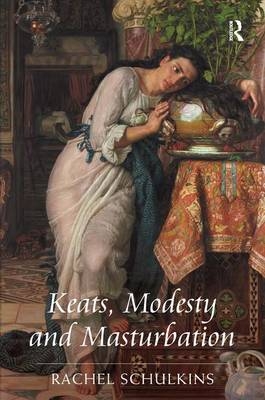
Keats, Modesty and Masturbation
Seiten
2014
Routledge (Verlag)
978-1-4724-1879-1 (ISBN)
Routledge (Verlag)
978-1-4724-1879-1 (ISBN)
Through close readings of Isabella; or the Pot of Basil, The Eve of St. Agnes, Lamia and 'La Belle Dame sans Merci,' Rachel Schulkins offers a re-evaluation of Keats and his poetry designed to show that Keats's sexual imagery counters conservative morality by encoding taboo desires and the pleasures of masturbation.
Examining John Keats’s reworking of the romance genre, Rachel Schulkins argues that he is responding to and critiquing the ideals of feminine modesty and asexual femininity advocated in the early nineteenth century. Through close readings of Isabella; or the Pot of Basil, The Eve of St. Agnes, Lamia and ’La Belle Dame sans Merci,’ Schulkins offers a re-evaluation of Keats and his poetry designed to demonstrate that Keats’s sexual imagery counters conservative morality by encoding taboo desires and the pleasures of masturbation. In so doing, Keats presents a version of female sexuality that undermines the conventional notion of the asexual female. Schulkins engages with feminist criticism that largely views Keats as a misogynist poet who is threatened by the female’s overwhelming sexual and creative presence. Such criticism, Schulkins shows, tends towards a problematic identification between poet and protagonist, with the text seen as a direct rendering of authorial ideology. Such an interpretation neither distinguishes between author, protagonist, text, social norms and cultural history nor recognises the socio-sexual and political undertones embedded in Keats’s rendering of the female. Ultimately, Schulkins’s book reveals how Keats’s sexual politics and his refutation of the asexual female model fed the design, plot and vocabulary of his romances.
Examining John Keats’s reworking of the romance genre, Rachel Schulkins argues that he is responding to and critiquing the ideals of feminine modesty and asexual femininity advocated in the early nineteenth century. Through close readings of Isabella; or the Pot of Basil, The Eve of St. Agnes, Lamia and ’La Belle Dame sans Merci,’ Schulkins offers a re-evaluation of Keats and his poetry designed to demonstrate that Keats’s sexual imagery counters conservative morality by encoding taboo desires and the pleasures of masturbation. In so doing, Keats presents a version of female sexuality that undermines the conventional notion of the asexual female. Schulkins engages with feminist criticism that largely views Keats as a misogynist poet who is threatened by the female’s overwhelming sexual and creative presence. Such criticism, Schulkins shows, tends towards a problematic identification between poet and protagonist, with the text seen as a direct rendering of authorial ideology. Such an interpretation neither distinguishes between author, protagonist, text, social norms and cultural history nor recognises the socio-sexual and political undertones embedded in Keats’s rendering of the female. Ultimately, Schulkins’s book reveals how Keats’s sexual politics and his refutation of the asexual female model fed the design, plot and vocabulary of his romances.
Dr Rachel Schulkins received her PhD from the University of Liverpool and is currently a lecturer at Liverpool Hope University, UK.
Introduction, Rachel Schulkins; Chapter 1 Keats, Modesty and the Politics of Sex, Rachel Schulkins; Chapter 2 Female Onanism in Keats's Romances, Rachel Schulkins; Chapter 3 The Economy of Romance in Keats's Isabella, Rachel Schulkins; Chapter 4 Phantoms of Sexual Repression in The Eve of St Agnes, Rachel Schulkins; Chapter 5 Figures of Romance and Anti-Romance in ‘La Belle Dame sans Merci’, Rachel Schulkins; Chapter 6 The Humanisation of the Serpent Lamia, Rachel Schulkins; Chapter 102 Afterthought, Rachel Schulkins;
| Erscheint lt. Verlag | 9.4.2014 |
|---|---|
| Verlagsort | London |
| Sprache | englisch |
| Maße | 156 x 234 mm |
| Gewicht | 476 g |
| Themenwelt | Literatur |
| Geisteswissenschaften ► Sprach- / Literaturwissenschaft ► Anglistik / Amerikanistik | |
| Geisteswissenschaften ► Sprach- / Literaturwissenschaft ► Literaturgeschichte | |
| Geisteswissenschaften ► Sprach- / Literaturwissenschaft ► Literaturwissenschaft | |
| ISBN-10 | 1-4724-1879-4 / 1472418794 |
| ISBN-13 | 978-1-4724-1879-1 / 9781472418791 |
| Zustand | Neuware |
| Informationen gemäß Produktsicherheitsverordnung (GPSR) | |
| Haben Sie eine Frage zum Produkt? |
Mehr entdecken
aus dem Bereich
aus dem Bereich
Poetik eines sozialen Urteils
Buch | Hardcover (2023)
De Gruyter (Verlag)
CHF 83,90
Buch | Softcover (2024)
belleville (Verlag)
CHF 27,95


